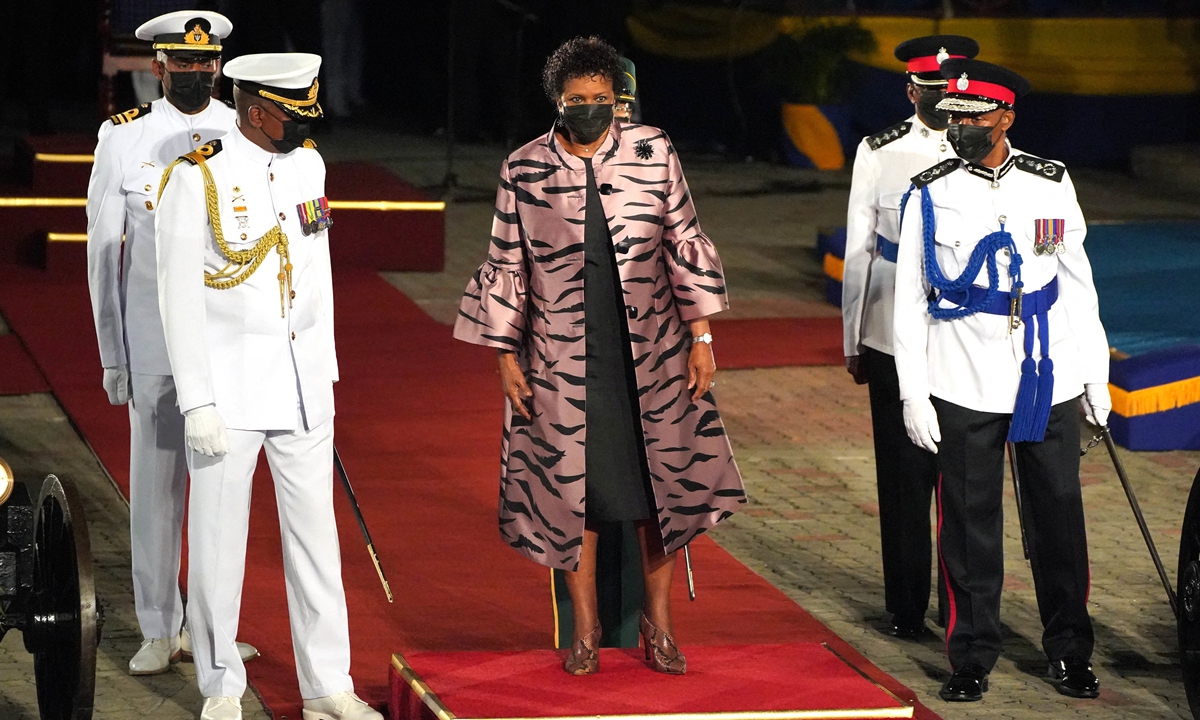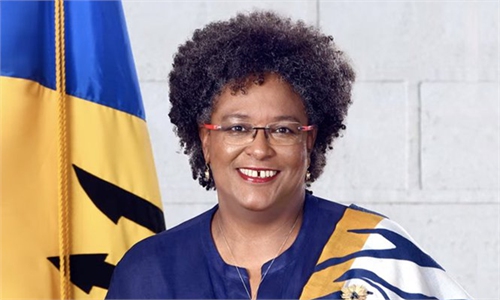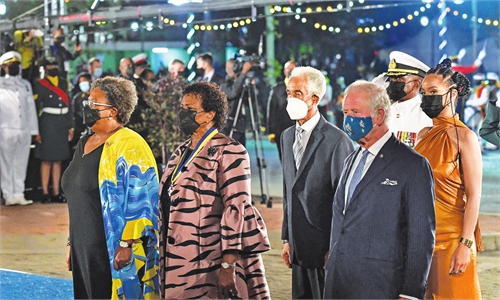
President Sandra Mason attends the Presidential Inauguration Ceremony at Heroes Square on November 30, 2021 in Bridgetown, Barbados. Photo: AFP
Barbados, an island nation in the Caribbean Sea, having officially removed Queen Elizabeth II as its head of state, became a republic in an overnight ceremony in the capital of Bridgetown. Sandra Mason was sworn in as the first president of Barbados on Tuesday when the country celebrated the 55th anniversary of its independence.Dubbed "little England," Barbados was the first overseas British colony. The island nation gained independence in 1966 and then became a realm of the Commonwealth that has the Queen as its monarch. In recent years, amid anti-colonial and anti-racial discrimination trends, more and more Barbadians began to think about the harm and pain that the colonial era had inflicted upon Barbados.
Severing ties with the crown
The Commonwealth is the legacy of British colonial rule. It is an anomaly in the "democratic" 21st century that an independent country has its former ruler as its head of state. The UK, a declining capitalist empire, fabricated this system that seemingly ensures the equality with its former colonies, in a bid to keep its advantageous position.
An anti-colonial wave triggering national independence started in the 1950s. Since Queen Elizabeth II took the throne in 1952, independence movements had swept Britain's former colonies, which severed their ties with the crown that were bound by commerce and bloody conquest. About 16 countries have cut ties and quit the Commonwealth. Now, only 14 countries still regard the Queen of the long-gone "empire on which the sun never sets" as their head of state.
Barbados was the first to part ways with the Queen in nearly three decades. This has far-reaching significance.
"Although it is more symbolic than substantial, it is still a big blow to the face of the British royal family and British government," Pan Deng, executive director of the Latin American and Caribbean Region Law Center at China University of Political Science and Law, told the Global Times.
"This revolution was declared in September 2020. The former suzerain didn't try to stop it while Britain's allies also refrained from getting involved by being partial to London," said Pan.
According to Pan, this showed the British royal family is aware of its waning power - it may want to hinder the process but it is incapable. Instead, Prince Charles went to Mason's inaugural ceremony and the Queen sent the country her "warmest good wishes."
Barbados is a small island with a population of under 300,000 in the Caribbean Sea, where British rule was influential. Pan believed the country could initiate a domino effect among the former vassals of the British Empire.
As a matter of fact, there was a debate on a republic option in Jamaica years ago. In January 2012, two months before Prince Harry's visit to the country, Portia Simpson-Miller, then newly elected prime minister of Jamaica, made a pledge to remove the Queen as head of state. "We need to complete the circle of independence. In this regard we will initiate the process of our detachment from the monarchy to become a republic with our own indigenous head of state," she said in her inaugural address.
Shabby Commonwealth
The Commonwealth is more like a club now: The Queen is the monarch but Britain barely has any deep influence over other members. For the UK, the Commonwealth is more proof that Britain's long-gone "golden era" was real. But for other Commonwealth Realms, it is nothing substantial. If a member decides that remaining in this club is no longer meaningful, it will naturally choose to cut ties.
Take Jamaica, again. "It [Jamaica] has rare direct connection with the UK except for British tourists visiting the island. Economically speaking, Jamaica is even closer to the US than to the UK because the US is nearer," Cui Hongjian, director of the Department of European Studies at the China Institute of International Studies, told the Global Times.
On the one hand, Britain wants to avoid the burden of its bloody colonial history. While on the other hand, it also wants to make full use of the cultural influence and identity it had brought to its colonies during the colonial era. "After Brexit, some in the UK began to discuss revitalizing the historical resources of the Commonwealth. However, Britain hasn't the strength to comprehensively assist all those realms, and it won't be necessary for Britain either. London may strive to keep Australia and Canada around, but it won't spend much time on countries like Barbados," Cui noted.
In recent times, some British elites have come to think of Barbados as no longer being a "little England" but is becoming a "little China," reflecting their limited perception of China. "They believe that no big country can avoid colonialism as they grow strong through exploring new markets and gaining resources," Cui said.
Nonetheless, colonization is accompanied by migration and also means cultural, political, and social transformation in the colony itself. China-Barbados relations have nothing to do with colonization. The relations are built based on the norm of building a community with a shared future for humanity to seek common development. "Little England" is a leftover of colonialism, but "little China" is entirely a fabrication by British elites who engage in disguised replacement of the concept. From this perspective, the limitation in the mentality also determines a difficulty for Britain to completely share equal ground with its former colonies.
Still lingering ghost of colonialism
Although after World War II, the old colonial system has been completely broken up, and the stark violence, exploitation, and hegemonic operations have been rejected by the international community, those former colonialists have never really given up their status to continue benefiting from colonialism. They talk of freedom, democracy, and equality, but at the same time, they try by any means to create various mechanisms and narratives to continue their veneered colonial aggression.
"The so-called overseas territories, the Commonwealth, and the associated countries are all the most blatant manifestations," Pan noted.
In September 2020 when it was announced that Barbados would drop the monarch by 2021, Mason said, "The time has come to fully leave our colonial past behind."
However, Pan believes that more subtle, indirect forms of colonialism can be found in political, economic, or cultural intrusion, and even in military interference, aimed to bring the people who have gained independence under control. By doing so, those countries would continue to serve as markets for the colonizers' goods and sources of raw materials where the colonizers can reap maximum wealth.
Presently, the world is in urgent need of bridging the huge development gap between regions, while it continues to confront many new global crises such as the ravaging pandemic, climate change, counter-terrorism, and energy issues. The vast majority of developing countries are facing bottlenecks in various sectors, but are unable to mobilize sufficient resources to bring about an impetus. Therefore, they urgently need developed countries to shoulder more responsibilities.
Some of developed countries should realize that the inequality in today's world and the underdevelopment of most countries have been caused by their hegemony and colonization. Besides, their actions today are even further exacerbating the catastrophe.
The future and destiny of the world should be in the hands of all countries. It is in the right direction of history, and it is the time for independent countries to decide their own affairs and participate in issues related to them. Besides colonialism, there is much more in the world that should be discarded into the rubbish heap of history.
The author is a reporter with the Global Times. opinion@globaltimes.com.cn


